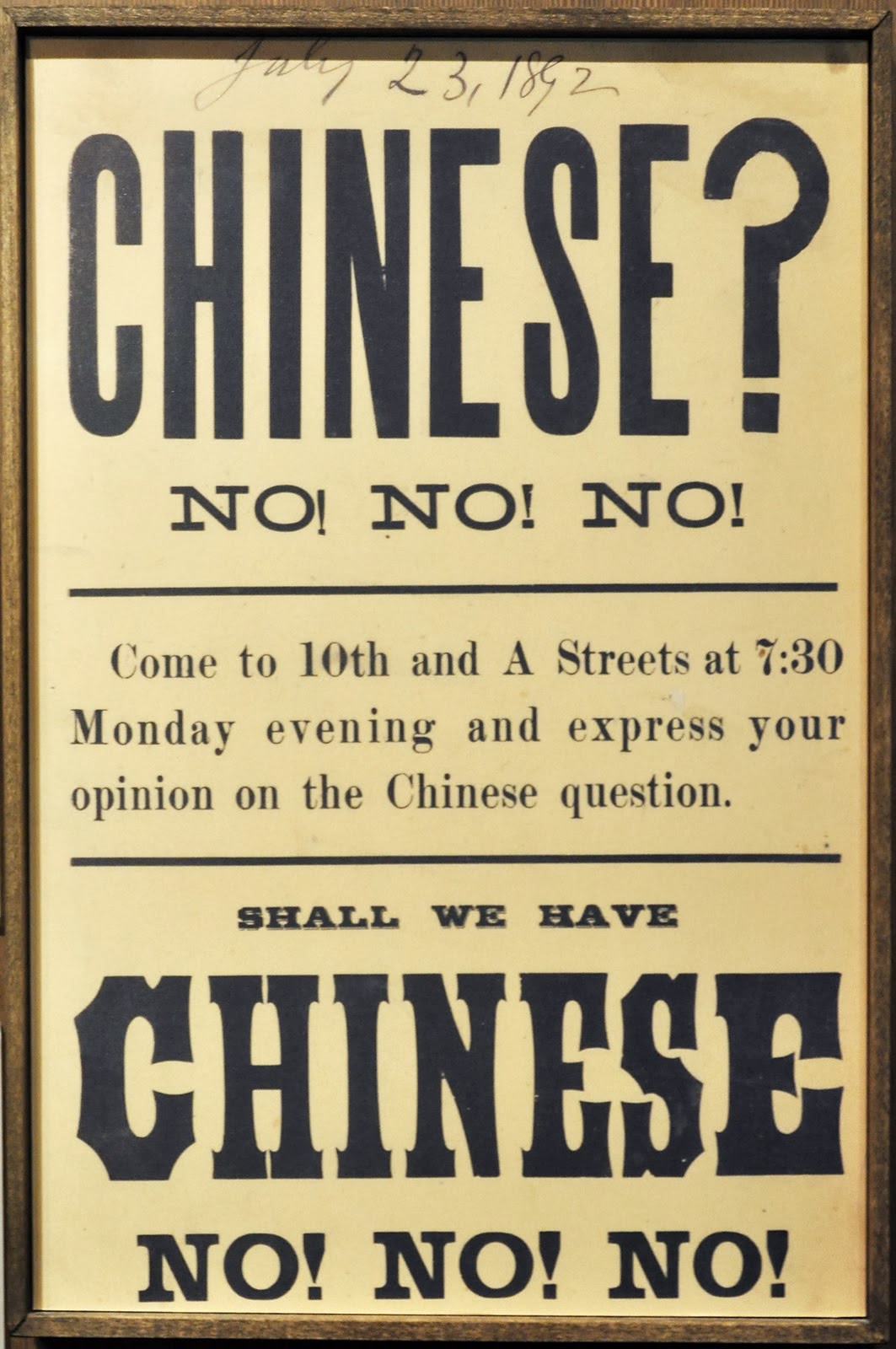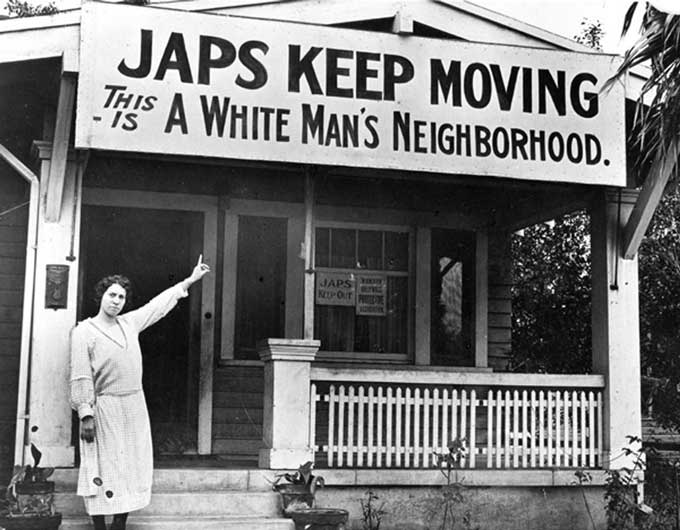Now, as the president of the United States, Donald Trump, just banned immigrant from 7 countries (primary Muslim countries) entering the United States for at least 90 days 27th of last month. I found an article that talks about those 9 moments when America closed their border in history on “Univision” which is Spanish-language TV broadcasting company in New York. This article is written by a Colombian journalist, Angélica Gallón Salazar. (Original article)
La prohibición de entrada a los Estados Unidos a los ciudadanos de siete países de mayoría musulmana no es único en su especie. Desde el siglo XIX, los vetos de inmigraciones han recaído sobre diferentes creencias y nacionalidades.
Prohibiting the entrance of people from 7 mostly Muslim countries is not the only kind. Since the 19th century, veto against immigrants came back because of different beliefs and nationality.
El 27 de enero de 2017 quedará marcado en la historia de los Estados Unidos como el día en el que se prohibió (por al menos 90 días) el ingreso de personas de 7 países de mayoría musulmana: Irak, Irán, Siria, Sudán, Yemen, Libia y Somalia, incluidos aquellos con ‘green card’. Como si se tratara de un viaje en el tiempo, la orden ejecutiva firmada por Donald Trump en el Pentágono recordó tiempos de expreso racismo de finales del siglo XIX, cuando los chinos fueron vetados por ser vistos como el mayor peligro para la nación.
January 27th, 2017 will remain in the American history as the day they prohibited the entry of people from 7 major Muslims countries: Iraq, Iran, Sudan, Yemen, Libia, and Somalia, including some of the green card holders. As if it is treated as a trip of the time, the signed executive order by Donald Trump in The Pentagon reminds of times of express racism at the end of the 19th century, when Chinese people were vetoed by beeing seen as the major danger to the nation.
El acto de Trump, repudiado por miles de manifestantes, efectivamente no es único en su especie. Néstor Rodríguez, profesor de sociología y experto en inmigración y crisis de fronteras de la Universidad de Texas, en Austin, explica que “Estados Unidos, quizás como ningún otro país, ha estado abierto a recibir inmigrantes y en la historia reciente se han batido records de asignación de ‘green cards'”, aunque también es un país que tiene “un largo historial de restricciones de entrada de extranjeros por sus fronteras que incluye razones de raza, de religión y hasta partidistas”.
Trump’s this act, repudiated by thousands of protestors, is definitely not his only kind. Néstor Rodríguez, a sociologist professor, and an expert in immigration and border crisis at University of Texas, Austin, explains “the United States, maybe nothing like any other countries, it has been open to having immigrants and recently in the history, they have beaten records of assignation of green card, although, it is a country that has “a large history of restriction of the entrance through its borders which includes reasons of race, religion, and even partisan.
Con la ayuda de este experto reconstruimos esas otras veces en las que las fronteras fueron cerradas, en las que los avatares políticos y mundiales hicieron que el sueño americano le fuera negado a muchos por su etnia, su país de origen o sus filiaciones políticas.
With this expert’s help, we constructed these other times, in which these borders were closed, and those times where political and worldwide changes made the American dream of many go away for their ethnicity, country of origin, or their political filiations.
1882
MAY 6TH
Ley para la exclusión de los chinos
Chinese Exclusion Act
“En los finales del siglo XIX el racismo era abierto y expreso y el país enfrentaba unas tasas altísimas de desempleo. De los chinos se decía ‘no son blancos’ y todos aceptaban eso como una realidad”, explica el profesor Néstor Rodríguez. Redactada por el presidente Chester A. Arthur, esta norma le prohibió la entrada a los chinos por 10 años, convirtiéndose en la primera ley significativa que restringía la entrada de inmigrantes a Estados Unidos. En ese tiempo, sólo los blancos eran ciudadanos. La premisa bajo la que se firmaba la ley era: ¿para qué los dejamos entrar si igual no pueden ser ciudadanos? Los chinos fueron vistos en esta época como culturalmente inferiores y como no cristianos. En 1907, el Congreso pasó una ley para quitarle la ciudadanía a las mujeres americanas blancas que se casaban con extranjeros, sobre todo, con asiáticos.
“At the end of the 19th century, the racism was open and express and the country was confronting to high unemployment tax. They used to say about Chinese “they are not whites” and everybody accepted this as a reality”, the professor Néstor Rodoríguez explains. Written up by the president Chester A. Arthur, this norm prohibited the entrance of Chinese for 10 years, making it the first significant law that restricted immigrant’s entrance into the United States. At this time, only the whites were the citizens. The principle premise behind the signed law was: for what do we let them enter if they cannot be citizens? Chinese people were seen, at this time, as culturally inferior not as individuals. In 1907, the Congress passed a law to take the citizenship from American white women who was married to foreigners, especially, to Asians.
Acto de exclusión de anarquistas
Anarchist Exclusion Act
Tras el asesinato del presidente William McKinley por el anarquista Leon Czolgosz en 1901, este acto intentó definir algunas categorías de inmigrantes inadmisibles. En la lista, además de a los chinos, se incluyó a aquellas personas que hubieran estado relacionadas con el anarquismo, y también personas envueltas en prostitución. Fue la primera vez que las filiaciones políticas fueron motivo de exclusión para los inmigrantes que querían entrar en el país.
After the assassination of the president William McKinley by an anarchist, Leon Czolgosz in 1901, this act tried to define some categories of immigrants who were not able to enter. In the list, in addition to Chinese people, people who would have been related to anarchism, and people who were involved in prostitution. It was the first time that the political filiation was cause for exclusion of immigrants who wanted to enter the country.
El Acto de prohibición de entrada a los japoneses (o a cualquier nacido en la “Barrera asiática”)
Immigration Act of 1924, prohibited Japanese entering
En los primeros años de 1900, un sentimiento de animadversión frente a los japoneses que entraban a vivir en la región oeste de los Estados Unidos escaló hasta hacerse virulenta. Aunque el gobierno de Japón limitó la migración de gente de su país a Estados Unidos para evitar las rencillas, el Acto de Johnson Reed prohibió definitivamente la posibilidad de acceso de los japoneses al sueño americano. “Preservar la composición racial del país es más importante que promover buenos lazos con Japón”, decidió el Congreso de entonces.
In the first years of 1900, a feeling of hostility towards Japanese who entered to live in the east region of the United States escalated until making it vicious. Although the Japanese government limited the numbers of immigrants to the United States from Japan to avoid dispute, Immigration Act of 1924 strictly prohibited the possibility of Japanese getting the American dream. Then Congress decided “to preserve the racial composition of the country is more important than to promote good bonds with Japan.”
El Acto de Johnson Reed contra inmigrantes europeos
Johnson–Reed Act against European immigrants
Este acto no solo determinó la prohibición de la entrada de los inmigrantes de países asiáticos, sino que quiso detener la migración europea proveniente de las secuelas de la Primera Guerra Mundial. Se creó así un sistema de cuotas. Las grandes cuotas se dieron a los británicos y franceses, pero se hicieron muy pequeñas y casi restrictivas para los italianos, polacos y judíos rusos. En esta ocasión quisieron incluir a los mexicanos entre la ley de cuotas, pero los grandes empresarios de California convencieron al Congreso de que si lo hacían iban a perder la mano de obra y por eso los excluyeron.
This law not only prohibited Asian entrance to the country but also tried to stop the European immigration coming because of the World War I. They created fee system. The Huge fee was imposed to British and French, but very small or almost restrictive for Italians, Polish, and Russian Jews. In this occasion, they tried to include Mexicans in the fee law, but the big companies in California convinced the Congress that they would lose labor force, and for that reason, they were excluded.
Repatriación mexicana (Mexican Repatriation)
Durante la Gran Depresión de 1929, el gobierno, más que negar su entrada, lanzó una campaña para que los trabajadores de esta nacionalidad que permanecían en territorio nacional regresaran a su país. Se implementó en varios lugares de EEUU y más de 400,000 mexicanos (algunos datos hablan de hasta un millón) regresaron a su país. Las hambrunas y la falta de trabajo que vivía Estados Unidos hicieron que los estadounidenses acusaran a los mexicanos de quedarse con sus puestos de trabajo. La mayoría de mexicanos regresaron voluntariamente y se les ofreció gasolina y hasta tiquetes para su viaje de vuelta.
During the Great Depression in 1929, the government, more than refuse their entrance, launched one campaign for the workers of this nation (Mexico) who were in national territory to go back to their country. It was implemented in many different places in the United States and more than 400,000 Mexicans (some data says it reached up to a million) went back to Mexico. Famine and unemployment that lived in the United States made lots of American people blame it on Mexicans who stays in the country with their jobs. The majority of Mexicans went back to Mexico voluntary and they offered them gas and even tickets for their flight.
1939
HASTA 1945 (SEGUNDA GUERRA MUNDIAL)
1939 UNTIL 1945 (WORLD WAR II)
Restricción de entrada de refugiados judeo-alemanes
Restriction of entrance of German Jewish refugees
El presidente Franklin D. Roosevelt consideró que los millones de refugiados provenientes de la guerra que se libraba en Europa representaban un peligro para la seguridad de la nación. Con el temor de que espías nazis se camuflaran entre esta gran masa de gente, el país limitó el número de judíos alemanes que podían entrar a 26,000 por año. Se estima que solo el 25% de esa cuota se cumplió durante el gobierno de Adolf Hitler.
The president Franklin D. Roosevelt considered that millions of refugees who were coming from the war and were freed in Europe represented a danger to the security of the nation. With the terror of the Nazis spies that would camouflage themselves in these great mass of people, the country limited the number of German Jewish that were possible to enter to 26,000 per year. They estimate only 25% of the entrance fee was completed during the Adolf Hitler’s government.
Acto de Inmigración Nacional para deportar comunistas
Immigration and Nationality Act of 1952










 I was surprised by how many regulations they have made in the history of immigration, and that really tells you that there have been a lot of immigrants that America accepted in the history. It made me sad hearing about the express racial discriminations against Chinese people later in 19th century, even though there are a lot of Asian people in the United States now. To talk a little bit about the author of this article, she is actually a Colombian writer in Miami. It was interesting to see her, as a Colombian, writing this kind of paper.
I was surprised by how many regulations they have made in the history of immigration, and that really tells you that there have been a lot of immigrants that America accepted in the history. It made me sad hearing about the express racial discriminations against Chinese people later in 19th century, even though there are a lot of Asian people in the United States now. To talk a little bit about the author of this article, she is actually a Colombian writer in Miami. It was interesting to see her, as a Colombian, writing this kind of paper.

Discussion
New Comments
No comments yet. Be the first one!